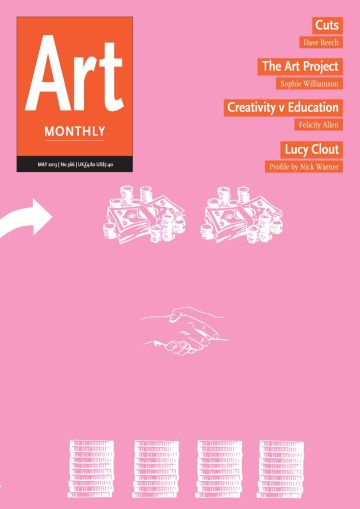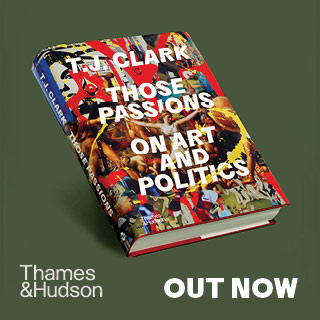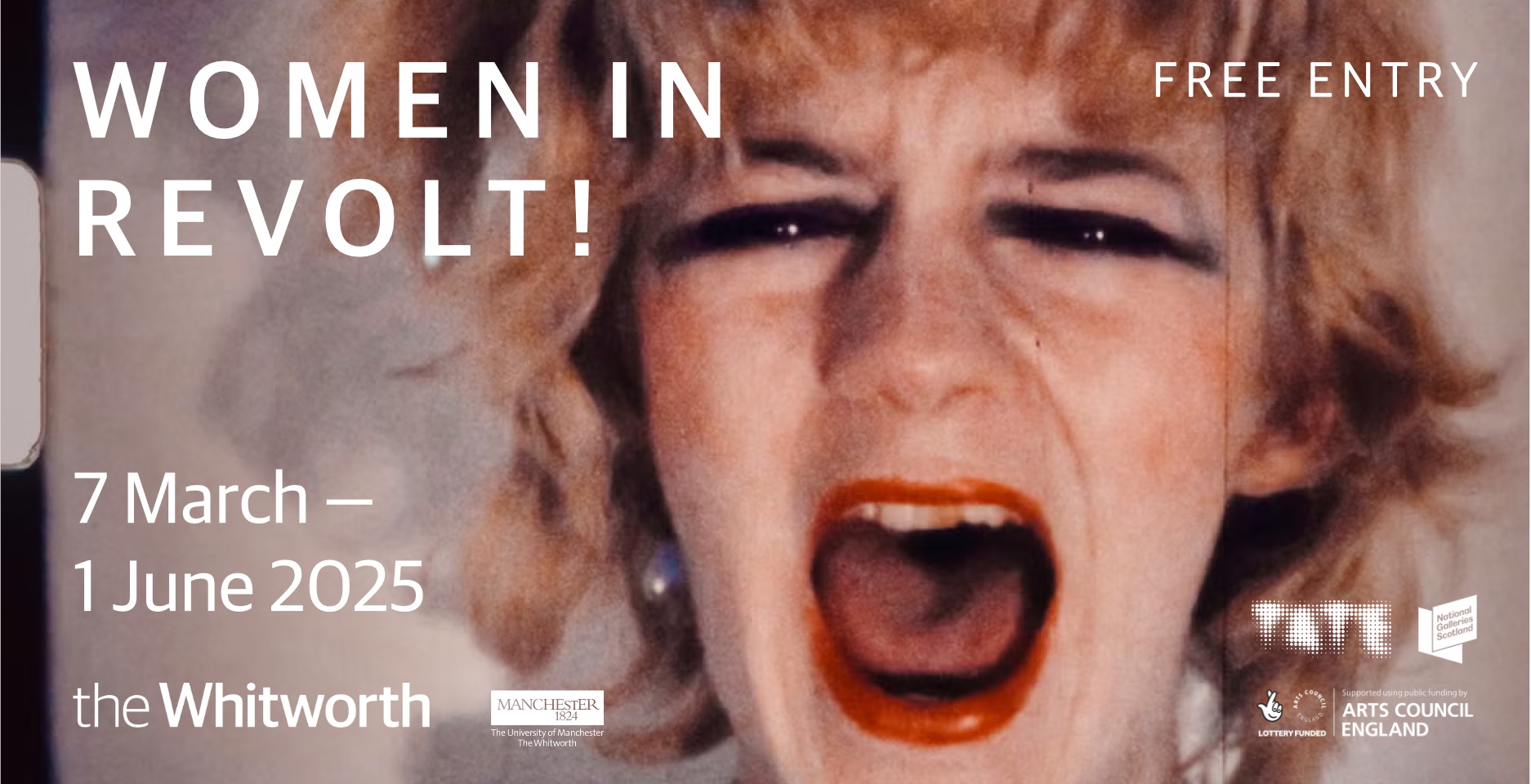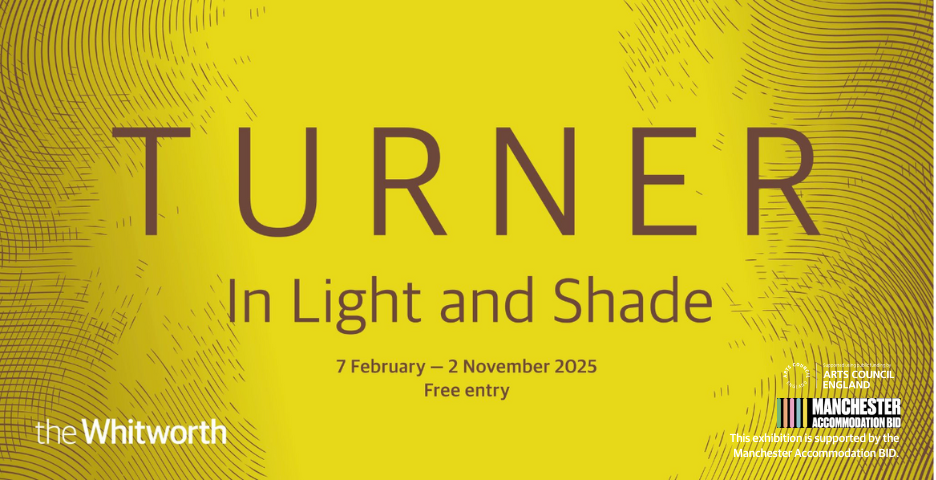Art Monthly 366
May 2013
Cuts
Dave Beech
The Art Project
Sophie J Williamson
Creativity v Education
Felicity Allen
Lucy Clout
Profile by Nick Warner
Buy Now – select:
Want to read this right now?
Get instant access to the entire back catalogue via Exact Editions from only £8.99!
Contents
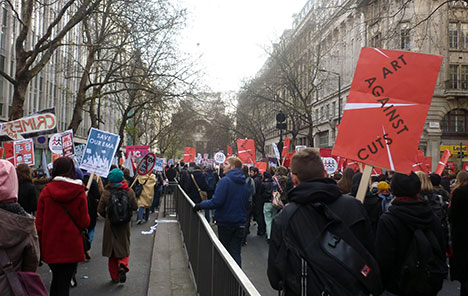
protest during Parliament's vote to increase university tuition fees December 2010
Feature
Cuts
Dave Beech on the neoliberal agenda behind the cuts in arts education
The sustained attack on funding for the arts and art education is not the unfortunate by-product of wider austerity measures, but rather the culmination of a long-term economic plan. Is not the only effective response, therefore, a critique of the very ideology driving this plan?
'Recent campaigns against the cuts and concomitant changes in the economics of art's public sector appear, unfortunately, to have failed to recognise the fact that the agenda has changed.'
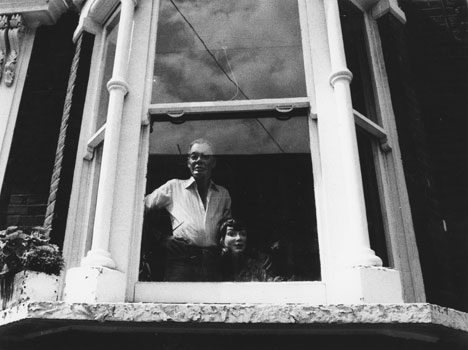
Ian Breakwell The Institution 1977-79
Feature
The Art Project
Sophie J Williamson on the value of projects with uncertain outcomes
If current art-funding models are increasingly risk-averse, what is the likelihood of open-ended projects, like Ian Breakwell's pioneering work with the DHSS for the Artist Placement Group, being commissioned in the future?
'In order to secure funding it has become increasingly necessary to satisfy the demands for tangible or quantifiable – and therefore "successful" – outcomes at the proposal stage.'
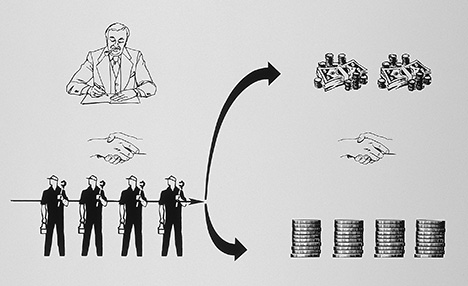
Allan Sekula School is a Factory 1978-80
Feature
Creativity v Education
Felicity Allen on the role of the sketchbook in the construction of the artist's 'self'
The formation of an expressive identity is key within art education, but recent trends actively block such organic development. With studies indicating a long-term decrease in student creativity, isn't it time to rethink our micromanagement of learning?
'Our managerialist assessment culture in education, which is promoted as giving access, consumer choice and fairness, in fact acts as a formidable form of surveillance and regulation. It is repressive and it keeps people in their place.'
Comment
Editorial
DIY Art Education
Since the neoliberal agenda for transforming art education into a free market has now reached completion, is this not an opportunity – just as the workshop became the academy, which became the art school, which became the university – for a grassroots reformulation of art education?
'Some 600 years ago, when Leon Battista Alberti fought for the recognition of art as a subject worthy of academic status on the basis of its theoretical and intellectual sophistication, he can hardly have intended this bureaucratic model of the academy.'
Artnotes
A new report examines the state of 'professional practice' provision within art education; the Treasury signals that more cuts are in the pipeline; austerity measures provoke an artistic response through the Museum of Creative Cuts; Picture This ceases to exist as an independent commissioning agency; galleries open and close; the latest news on commissions, appointments, prizes and more.
Submissions: Send Artnotes info to artnotes@artmonthly.co.uk
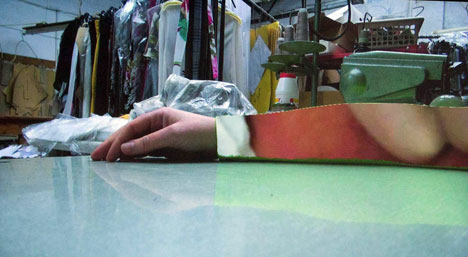
Lucy Clout Shrugging Offing 2013
Profile
Lucy Clout
Nick Warner on the video performance artist
Lucy Clout negotiates the sticky discourse surrounding performance art and its documentation, producing works that both hark back to performance art history while also alluding to the amateur instructional videos currently trending on YouTube.
'Clout seems equally concerned with this critical interchange between the primary experience of the live event and the secondary experience of the recorded event. However, she does not value live over playback, but instead takes as a prominent focus the notion of the act of documenting as medium in itself.'
Reviews
Exhibitions
Nasrin Tabatabai & Babak Afrassiabi: Seep
Chisenhale Gallery, London
Colin Perry
Sharjah Biennial 11: Re:emerge – Towards a New Cultural Cartography
various venues
Omar Kholeif
Kenneth Anger: Icons
Sprüth Magers, London
Christopher Townsend
Glam! The Performance of Style
Tate Liverpool
Bob Dickinson
Navid Nuur: Phantom Fuel
Parasol unit, London
Paul Carey-Kent
Edinburgh & Glasgow Round-up
Scottish National Gallery of Modern Art • GoMA • The Modern Institute • Summerhall
Rosie Lesso
London Round-up
British Museum • Wellcome Collection • Whitechapel Gallery • Cafe Oto • Space
David Morris
Reviews
Artists' Books
Laure Prouvost: The Artist Book
Adam Pugh considers the filmmaker's excursion into print
'If the book is a portrait of a real artist, whose name might be Laure Prouvost, then it is a portrait summoned almost entirely by that which it omits. And if that is the case, then it adroitly and sensibly evades the critics and curators again, which it seems is exactly the right – indeed possibly the only – way to preserve a space in which formlessness activates meaning.'
Reviews
Books
Utilitarianism and the Art School in 19th Century Britain
Dave Beech on Malcolm Quinn's recuperation of radical Benthamism
'Since Jeremy Bentham and Benthamism were probably the original referent of the adjective 'radical', Malcolm Quinn's primary aim – to reclaim the art school as a radical institution – has more merit than the history of institutional critique and the neoliberal attack on art education might suggest.'
It's the Political Economy, Stupid: The Global Financial Crisis in Art and Theory
Martin Patrick on Gregory Sholette and Oliver Ressler's anthology
'John Roberts outlines the context of the recent "social turn" in art practice and how increasingly "relational" approaches paralleled a decline in opportunities for artists in terms of exhibitions and teaching, and their corresponding enlistment into the workforce as "cognitive creative/technicians".'
Reviews
Sound
Lundahl & Seitl: The Memory of WT Stead
Christopher Townsend experiences a performance in a piano showroom
'The real or yearned-for plenitude of early modern culture included a very clear sense that everything was materially perishable, and that everything, however infinitesimally slowly and faintly, faded to nothing.'
Opinion
Polemic
Disrupting Art Education
David Barrett on the future of the art education market
'The traditional pyramid structure of education, with a vast swathe of foundation students filtering through to ever-narrowing groupings of BA, MA and PhD students, is being turned on its head. Over-delivering towards the top end while under-serving at the base – surely that is not sustainable in business terms?'
Reports
Letter from Delhi
Rediscovering Ourselves
Virginia Whiles witnesses attempts to develop Indian art discourse
'The gap between making art and discursive practice is as fragile in India as anywhere. One potential solution, suggested by the remarkable pedagogy at the SN School of Arts in Hyderabad University as an alternative to western-based critical theory, is to listen to the stories of the students who come from highly diverse ethnic, cultural and class backgrounds.'
Reports
Radio
Open Air
Andrew J Stooke tunes in to Radio 4's Artangel commissions
'Open Air is a series of broadcast radio interventions commissioned by Artangel with Radio 4. They were softly wedged into the schedule, freely exposed to Radio 4's potential ten million listeners. This was a departure for Artangel. Previous productions, in far out venues, have required audience commitment verging on pilgrimage. This motif of dedication was not entirely lost, however, as the pieces were played throughout Christian Holy Week, calling the devoted to the radio at an appointed time.'
Artlaw
Copyright
Renting Art: Borrowers and Lenders Beware
Henry Lydiate sees a problem for the new art-rental companies
'Economic times are tough in the public sector, and drives for income generation by museum and gallery institutions often include lending works on a commercial basis. The private sector has seen a steady increase in the commercial lending of works, often arranged via online browsing, selection and payment, plus swiftly couriered dispatch to the borrower: renting.'
Listings
Exhibitions
Exhibition listings
Art Monthly's exhibition listings can also be viewed online.

